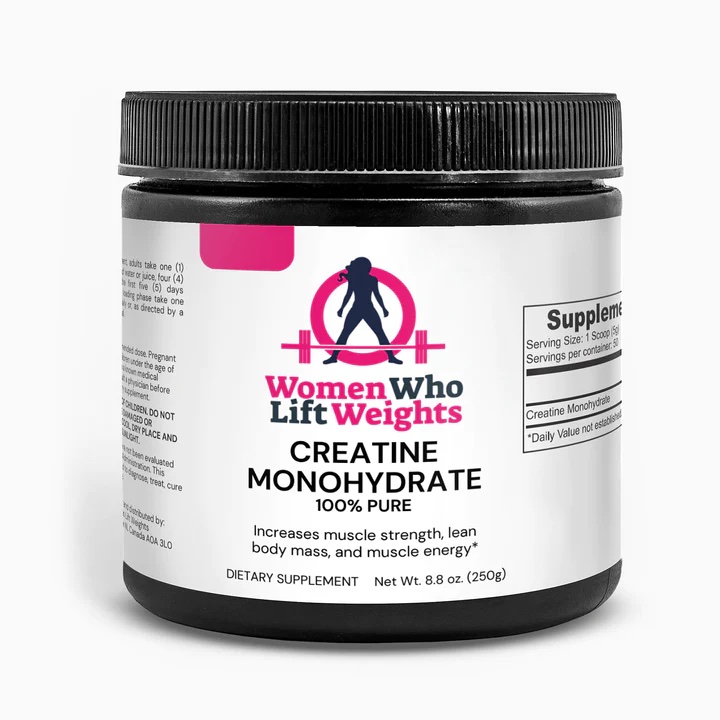Top 10 Benefits of Creatine for Women
Top 10 Benefits of Creatine for Women Who Lift Weights
As more women venture into the world of lifting weights and strength training, it’s essential to explore the various tools that can maximize their performance and results.
One such tool is creatine.
A supplement commonly associated with its benefits for male athletes.
However, women can also reap numerous advantages from incorporating creatine into their fitness routine.
In this article, we’ll delve into the top 10 benefits of creatine specifically for women who lift weights.
Increased Strength and Power:
Creatine is renowned for its ability to enhance strength and power. By increasing the body’s capacity to generate energy during high-intensity activities, women who use creatine may experience significant improvements in their weightlifting performance.
Enhanced Lean Muscle Mass:
Creatine supplementation promotes the accumulation of lean muscle mass. It increases intracellular water retention, resulting in improved muscle fullness and definition, making your hard work in the gym even more visible.
Improved Anaerobic Capacity:
Creatine plays a vital role in replenishing adenosine triphosphate (ATP), the body’s primary energy source for short bursts of intense exercise. By enhancing ATP availability, creatine helps women perform better during anaerobic activities like lifting heavy weights or engaging in explosive movements.
Faster Recovery:
Creatine supplementation has been linked to faster recovery between intense workouts. By replenishing energy stores more efficiently, it aids in reducing muscle soreness and fatigue, allowing you to bounce back quicker and train more frequently.
Increased Metabolic Rate:
Creatine has shown a slight increase in resting metabolic rate, which can be advantageous for women seeking to manage or lose weight. A higher metabolic rate means burning more calories at rest, supporting their overall fitness and body composition goals.
Boosted Cognitive Function:
Research suggests that creatine may have cognitive benefits, including improved memory, attention, and mental processing speed. By supplementing with creatine, women can enhance their mental performance both inside and outside the gym.
Support for Bone Health:
Women are more susceptible to age-related bone loss, but creatine may help in maintaining bone health. Studies have indicated that creatine supplementation can increase bone mineral density, potentially reducing the risk of osteoporosis.
Hormonal Balance:
Creatine can play a role in supporting hormonal balance. It helps regulate insulin-like growth factor-1 (IGF-1), a hormone crucial for muscle growth and repair. Maintaining optimal hormonal balance can be particularly beneficial for women as they navigate changes during different life stages.
Enhanced Endurance:
Creatine supplementation has been associated with improved endurance performance, enabling women to sustain their efforts for longer periods. This benefit can be advantageous for activities such as endurance weightlifting sets or high-intensity interval training.
Overall Well-being:
By improving performance, body composition, cognitive function, and bone health, creatine supplementation contributes to an overall sense of well-being. Feeling strong, accomplished, and confident can positively impact all aspects of a woman’s life.
Conclusion:
Creatine supplementation offers numerous benefits specifically tailored to women who lift weights. From increased strength and power to improved muscle mass and cognitive function, creatine can enhance performance, support overall health, and help women achieve their fitness goals. As always, it’s crucial to consult with a healthcare professional before starting any new supplement regimen to ensure it aligns with your individual needs and circumstances.
Remember, creatine is just one tool in your toolbox. Combine it with a well-balanced diet, proper training, and rest to unlock your true strength and unleash your full potential as a woman who lifts weights.
Feel free to check out our WWLW Creatine at our store HERE.

References: Buford, T. W., Kreider, R. B., Stout, J. R., Greenwood, M., Campbell, B., Spano, M., Ziegenfuss, T., Lopez, H., Landis, J., & Antonio, J. (2007). International Society of Sports Nutrition position stand: creatine supplementation and exercise. Journal of the International Society of Sports Nutrition, 4(1), 6. doi:10.1186/1550-2783-4-6
Candow, D. G., Chilibeck, P. D., Burke, D. G., Davison, K. S., Smith-Palmer, T., & Burke, D. G. (2011). Effect of different frequencies of creatine supplementation on muscle size and strength in young adults. Journal of Strength and Conditioning Research, 25(7), 1831-1838. doi:10.1519/JSC.0b013e31823a3e2c
Kreider, R. B., Kalman, D. S., Antonio, J., Ziegenfuss, T. N., Wildman, R., Collins, R., Candow, D. G., Kleiner, S. M., Almada, A. L., & Lopez, H. L. (2017). International Society of Sports Nutrition position stand: safety and efficacy of creatine supplementation in exercise, sport, and medicine. Journal of the International Society of Sports Nutrition, 14(1), 18. doi:10.1186/s12970-017-0173-z
Gualano, B., Novaes, R. B., Artioli, G. G., Freire, T. O., Coelho, D. F., Scagliusi, F. B., & Lancha Jr, A. H. (2008). Effects of creatine supplementation on glucose tolerance and insulin sensitivity in sedentary healthy males undergoing aerobic training. Amino Acids, 34(2), 245-250. doi:10.1007/s00726-007-0513-7
Volek, J. S., Kraemer, W. J., Bush, J. A., Incledon, T., & Boetes, M. (1997). Testosterone and cortisol in relationship to dietary nutrients and resistance exercise. Journal of Applied Physiology, 82(1), 49-54. doi:10.1152/jappl.1997.82.1.49
Chilibeck, P. D., Kaviani, M., Candow, D. G., & Zello, G. A. (2017). Effect of creatine supplementation during resistance training on lean tissue mass and muscular strength in older adults: a meta-analysis. Open Access Journal of Sports Medicine, 8, 213-226. doi:10.2147/OAJSM.S12352

Rob King is a Competitive PowerLifter, Coach and Writer.





